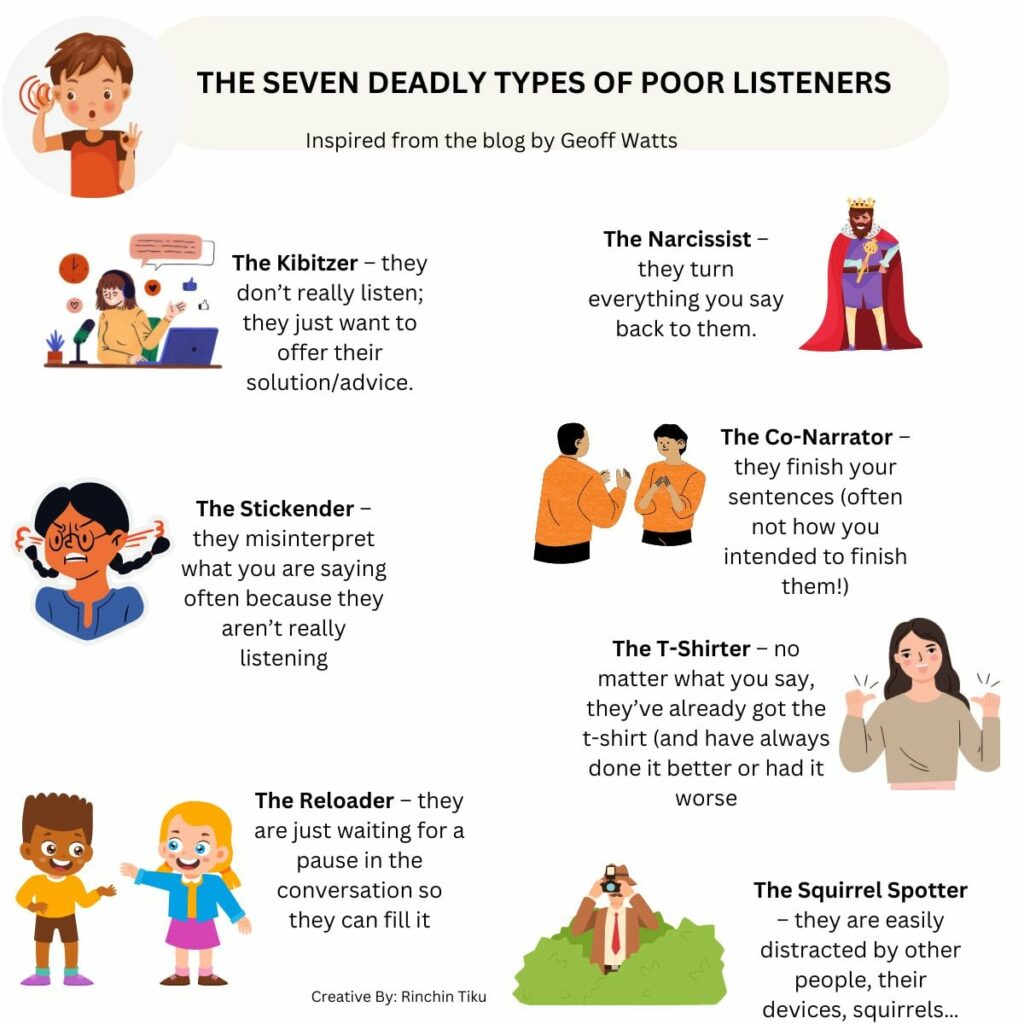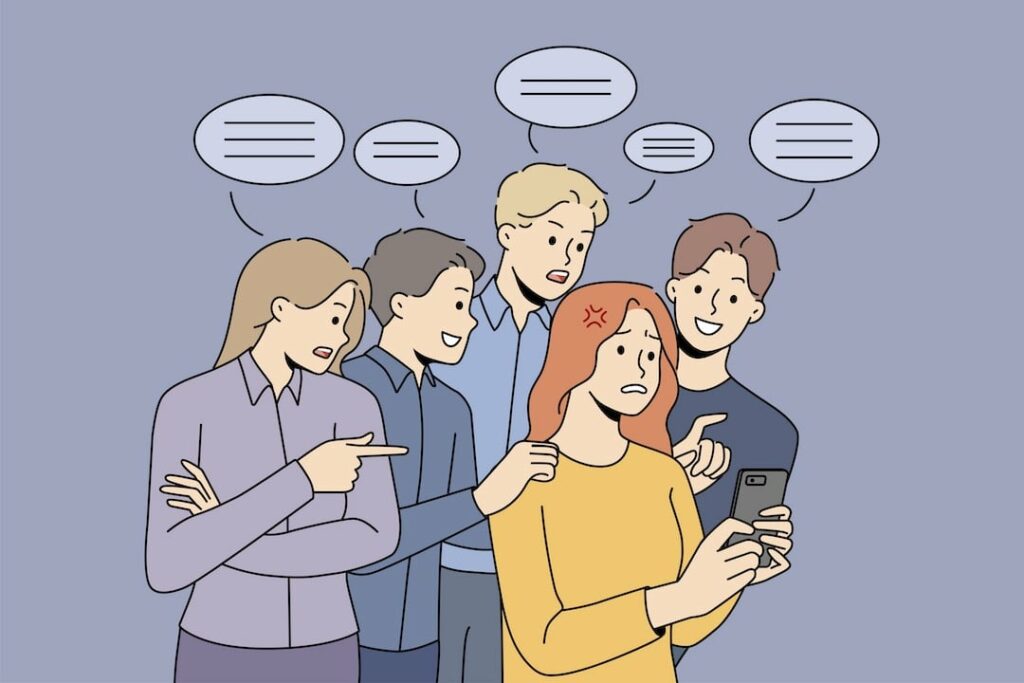The 7 Deadly Types of Poor Listening and How to Improve Your Active Listening Skills
Posted By - Geoff Watts

Have you ever had a conversation with someone who wasn’t really listening to you? They might have interrupted you, finished your sentences, or been preoccupied with something else entirely. Active listening is a crucial skill for effective leadership but poor listening habits like these are unfortunately common in today’s distracted world.
Whether you are a Scrum Master, a Product Owner or a member of a delivery team, the ability to listen well is important to success. In this article, we’ll explore the 7 deadly types of poor listening and provide tips for improving your active listening skills.
Why Active Listening Matters
Active listening is a vital component of leadership and communication. Research has shown that people spend only 50% of their time actively listening during conversations, and the other 50% on activities such as daydreaming or preparing a response.
When you factor in a study conducted by the University of Michigan, which found that people who are preoccupied with their own thoughts and feelings are more likely to interrupt others in conversations, it’s clear that listening deserves more attention.
In contrast, active listening can build rapport and trust, improve problem-solving, and foster a culture of collaboration and teamwork.

Not all Forms of Poor Listening Are The Same
I’ve found that there are actually multiple different types of (not) listening and if we can identify which one is our own personal achilles heel we can target our efforts to improve this key attribute of leadership.
The Seven Deadly Types of (non) Active Listening:

The Kibitzer
Symptoms:
To kibitz is to offer unsolicited advice. You know the type. You’re telling them about how you got stuck in awful traffic and they just reply with “Well, what you should have done is take this back road” or “Next time, leave 15 minutes earlier and go this way”.
Consequences:
Even if the intent behind this advice is well-intentioned, the ‘listener’ comes across as showing little empathy. It can also appear as though you think them incapable of having already thought of that as an option. The kibitzer just gives off a sense of arrogance. They are effectively saying “I wouldn’t have gotten into that problem so you must be stupid.”
Treatment:
Instead of offering advice, pause. Tell them that you have heard them and can sense the emotion that is coming from them (for example frustration) and perhaps ask “Is there anything I can do to help with that?”

The Narcissist
Symptoms:
A narcissist is someone who thinks the world revolves around them and manages to make everything about them.You might notice the ‘listener’ saying something like “I know what you mean. When I was driving the other day…” and then hijacking the conversation to talk about their experiences. While there is significant benefit to finding common ground through shared experiences, there is a difference to normalising their experience with your own and making the conversation all about you.
Consequences:
This is interesting because one aspect of active listening involves mirroring and empathising, building rapport through common experience. However, a narcissist isn’t doing this to build connection, they are doing it for attention and it comes across as really annoying.
Treatment:
Get curious. Imagine the person you are listening to is narrating an audiobook. You can’t interrupt an audiobook so be curious about what is on the next page. If you feel compelled to say something then perhaps have the phrase “Ooh could you tell me more about that?” in your back pocket.

The Co-Narrator
Symptoms:
The co-narrator is a term given to somebody who has a habit of finishing others sentences; effectively inserting themselves as a co-narrator of that person’s story. A co-narrator
Consequences:
Like the Narcissist, there is a fine line here because sometimes showing that you know what that person is about to say can be seen as a sign of empathy and shared experience, deepening rapport.
However, it’s a risk because if you get it wrong then it has a very jarring effect. In my experience the small potential gain is not worth the large potential downside so I advise avoiding this.
Even if you do manage to guess it correctly, it can often be seen as disrespectful and, even worse, cause that person to lose their train of thought. Usually it comes across as arrogance or a power-play and often stems from impatience on the part of the ‘listener’.
Treatment:
This aspect of active listening (ironically) takes time to master as it involved gradually becoming more and more comfortable with silence. Like the Narcissist, curiosity and imagining you are listening to an audiobook can help. Almost playing a game in your mind to see if what you were going to say ends up being what they do say. Keep a mental log of how often it turns out to be different and use that as justification for staying silent longer.

The Squirrel Spotter
Symptoms:
You know this type; they interrupt because they’ve noticed a squirrel or something equally unimportant that completely derails the conversation and shows they are more interested in what is going on around them than listening to you.
It might not literally be a squirrel obviously. It could be the notifications on your phone or people walking past behind the person you are listening to. In essence it doesn’t matter; your attention is being diverted from where the other person wants it to be, namely on them.
Indeed, a device doesn’t even need to be on for it to reduce the quality of listening and communication. See this study on the ‘iPhone effect’.
Consequences:
Sometimes it’s useful to be able to “zoom out” and notice what’s going on in the periphery or how the energy or body position of the person talking is changing rather than being laser focused on the speaker’s mouth or eyes. However, the implication that what they are saying is less important to you than an arboreal, bushy-tailed rodent is quite an ego-dampener.
Treatment:
Developing your attention span is something that can be done through mindful practice. Deliberately spend time focusing on one thing to the exclusion of all else (perhaps the end of your nose or bird song in a park). As soon as you notice your mind wandering, just bring your attention back to that point of focus. It’s important not to berate yourself for losing your attention but just simply to bring your attention back as quick as you can.

The Stickender
Symptoms:
You’ve just spent a good few minutes explaining the report that you’ve just created and the person you’re talking to thinks you have created something to spy on them rather than help them. They’ve got completely the ‘wrong end of the stick’.
Of course, this could be down to the communicator not getting their message across clearly or it could be down to poor listening or filtering the information through their own lens and expectations.
Consequences:
As well as wondering if you were even listening at all, there is the risk that they doubt themselves as a communicator and doubt your intelligence. They might even wonder if you are trying to influence or manipulate them to hold a different interpretation. If nothing else the lack of alignment has the risk of reducing the rapport between you.
Treatment:
Play back what you have understood at regular intervals, checking you are hearing and interpreting things as the communicator intended. Not just at the detail level either. Consider enquiring about their high level goals so you can put what you are hearing into the correct context. Ask with curiosity rather than making assumptions.
The Reloader
Symptoms:
The reloader is someone who is looking to create an opportunity to interject. They might be making noises or gestures to indicate they want to speak, subtly encouraging you to hurry up with what you’re saying so they can have their turn.
Steven Covey once said most people listen with the intent to reply – these are reloaders. Your airtime is simply an inconvenient gap in their monologue. This person is rarely listening to the words, they are more listening for a gap to start talking again.
Consequences:
The communicator may rush their point and skip some important informational or simply feel like there is little point in them talking. They can feel like an inconvenience as they are stopping the listener from doing what they want to do i.e. talk.
Treatment:
Remind yourself that listening is a service and that there are other times for you to share your thoughts. If you are worried about losing an idea then make a point of making a note rather than trying to force it into the conversation. Learn to enjoy listening to other people and not having to fill the airtime with your own voice.

The T-Shirter
Symptoms:
This is in reference to the person who is always unimpressed with what you have to say. They’ve ‘been there, done that, got the t-shirt’ and are effectively (and sometimes literally) saying “And…? So what..?”
Consequences:
Regardless of whether this is a big deal to you when you are listening, it’s obviously a big enough deal for the person who is telling you so be respectful, empathise or risk coming across as rude, aloof and arrogant.
Treatment:
Have a goal in mind for the conversation. What do you want the outcome of the conversation to be? Do you want that person to feel heard, valued and safe or do you want to impress them with your achievements and experience? The act of enquiring how that impacts them is a good thing; it avoids you assuming a certain impact. However enquire with compassion and genuine curiosity not judgment or incredulity.
Do I Really Do Any Of Those Things?
Perhaps you already suspect that you fall into one of those traps. Maybe now you’re worried that you might be. But how do you actually find out? Well, my advice is to be brave and actually ask people.
Show people who you regularly communicate with this list and ask them:
“On a bad day, which of these personas do I tend to take on?”
They may be a little uneasy about giving you feedback so position it as a favour they are doing you because you want to become a better listener and leader. Without the knowledge it’s difficult to correct and this is something that isn’t always easy to self-diagnose.
Update
If instead of upping your listening game, you want to help someone else improve their listening skills then you might want to check out this article…it’s also got some great resources you might find useful too!






